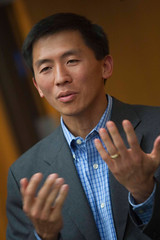Well, sometimes it is just oil. Greg Lucas examines Texas Governor Rick Perry’s attacks on California.
By Brian Leubitz
Texas Governor Rick Perry has been running around the country talking up his “Texas miracle” of economic glory. He has spent much of his time attacking California and trying to lure companies to move. Before they go, they may want to check not just the temperatures, which have been boiling, but also the air and water quality reports. Oh, and perhaps review the labor market in Texas.
In Capitol Weekly today, Lucas examines the “facts” that Perry is spewing. To put it mildly, there is another side of the story. Perry is benefitting from smart progressive policies, like a limit foe home equity loans to 80% of value and a tax on every barrel of oil that comes out of the ground. You know, the oil extraction tax that Repulicans have been fighting desperately when it is brought up here.
And then there is thet dirty side of the economic “boom” that Perry won’t tell you about:
But Texas also leads the nation in dirtiest air, amount of toxic chemicals released into the water and hazardous waste generated, according to statistics from various sources compiled in Texas on the Brink, a publication of the Texas House of Representatives Legislative Study Group.
Texas also has the nation’s highest percentage of minimum wage jobs and the lowest percentage of residents with a high school diploma in the country. Of adult Texans, nearly 32 percent are college graduates – almost 38 percent of Californians are.
Almost 30 percent of Texans are uninsured – more than 6 million persons of whom 60 percent are Hispanic. Texas also has the highest percentage of uninsured children in the country.
In Texas, 17.2 percent of the population lives in poverty compared to 13.2 percent in California where the median income is $59,000 versus $48,000 in Texas.
I grew up in Texas, and I go back frequently. There are some great things about Texas. Because of the foresight of early leaders in retaining mineral rights to the state, I received and excellent education at a great value. But the Tea Party extremists run rampant, and the environment is still seen as something for corporate plunder.
There are a lot of Republicans, and even a few Democrats, who think we should follow the Texas model. But all that glitters, well, it isn’t always gold. Sometimes it is just a bunch of oil in the ground and the fog of dirty air and water.


